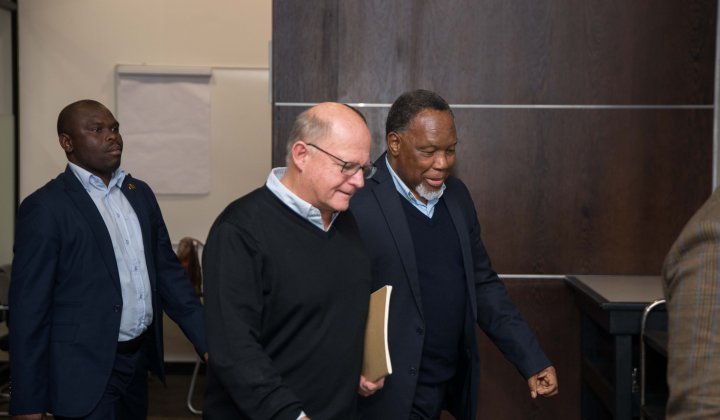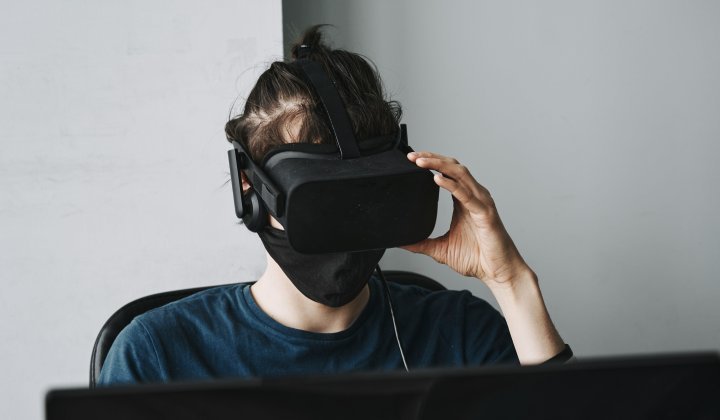In the past few months a startup called Practica has launched an artificial intelligence (AI)-driven chatbot for professional mentorship. Whoop Coach, a wearable technology brand, started using ChatGPT to offer more personalised recommendations regarding health queries based on individual biometric data. Professional social networking site LinkedIn added an AI career coach to its premium members to help job-seekers to research companies and positions and prepare for interviews.
The global coaching industry is certainly taking note of the rise of so-called AI "coaching" tools. In November, the independent Association for Coaching hosted a two-day online event exploring the evolving intersection of coaching and technology and how AI is shaping coaching. In October, GIBS held a seminar delving into the same topic, with PhD candidate, coach and AI entrepreneur Olivier Malafronte and GIBS lecturer and professional coach Dr. Gloria Mbokota presenting.
For the most part the takeaways from these discussions are unrelentingly upbeat. So much so that it’s easy to get swept up in the idea of putting a virtual guide in everyone’s pocket, thereby making personal change and development available to all at unprecedented scale. As academics with enquiring – albeit sceptical – minds, it is important to look at this potential critically, to debate, explore and learn about the benefits of AI, as well as the ethical boundaries, and even whether this new high-tech tutor belongs under the wing of executive coaching or should be seen as a complementary tool. To do this, we need to be realistic about AI’s possible benefits and limitations.
Weak, strong and super AI
AI broadly comprises what the technology world refers to as "narrow intelligence" and "general intelligence". Facial recognition systems and disease-predictive algorithms are examples of narrow intelligence, or "weak AI". They are capable of performing set, single functions and adding value within those defined parameters. General intelligence – or "strong AI" – ratchets things up a bit, by enabling applications like ChatGPT to access knowledge and generate responses across various contexts. Other examples of general intelligence in an AI setting would be self-driving cars (which must be able to respond to different conditions and situations) and chatbots (which can respond to human queries).
For the record, the end goal of AI is not strong AI but "superintelligence AI", where machines outperform humans. Depending on who you speak to, that super future could be anything from 20 to 50 years away. Right now we are treating AI as if it’s reached super status when, in fact, it has barely dipped its toe into the world of general intelligence.
What is surprising is that technologists and users alike are undaunted in unleashing what is essentially a nascent technology onto a complex and multi-faceted, human-centric role like professional coaching.
While a human being has general intelligence, and can pick up inflections and information by listening as well as sensing and observing body language and eye contact, AI is process-driven. These digital tools can help you apply a systematic process to achieving goals, and it can assess the progress you’ve made. What it can’t do is lead you though change into the unknown, help you develop a deeper capacity for personal awareness that enhances potential, understand human affinity, or even support a reflective approach to personal problem-solving.
Process or people?
At this point, all AI can do is give a thousand different options and, based on previous data from similar situations, outline the most likely route to follow. This hardly fits with the idea of human beings as original, complex, thinking individuals.
The work of coaching must, by its very nature, be highly personalised, transformative and involve a deep understand of neuroscience, the human brain and human psychophysiology. This sort of internal, ongoing, personal work is exploratory in nature, it’s about discovery, rather than digging into something that is already known. That is why the role of a coach is not to offer advice or to trot out a plan of action from a script or formula, but to work with the individual, gently guiding them to go deeper and deeper into their own exploring work, surfacing values and beliefs and breaking through barriers, biases and blind spots caused by closed thinking and self-preservation patterns.
Would an AI be equipped to spot these subtleties?
This raises the question around where, amid these potential shortcomings, AI could fit into the coaching process. Those who believe AI holds great potential in the coaching realm suggest that the advantages include efficiency and availability, scalability, real-time feedback, ease of use and accessibility. Provided that the coachee has a clear, concrete, discrete and relatively simple idea of what issues they want to resolve, and goals they want to achieve, then the in-built prompt engineering of AI tools like Panda AI, Rocky AI, Poised, CareerHub AI and Interflexion could provide a response around goal-setting. Certainly, some coaches do work with fairly surface-level goals and set methodical steps to obtain them. However, even with something as straightforward as goal-setting, there are real concerns about how a human being in conflict about their future direction can confidently outline a plan of action if their personal self-knowledge and confidence is still on shaky ground. Parroting back what has just been said simply won’t be sufficient to achieve what an experienced human coach could by peeling away the layers.
Hypothetically speaking…
In time, these glitches and deficiencies will be ironed out. Maybe in two or three generations AI will be able to take over the coaching reins from humans, but right now we need to be clear that AI as a coaching tool is in its infancy. What exists currently is more an enabler, perhaps a co-pilot, than a fully-fledged coach. While we must still continue to explore and debate the merits and deficits of abdicating coaching to an algorithm, it is also important for the professional coaching industry, tech startups and commentators to keep AI in its lane, playing to the relative strengths of both AI and human coaching to achieve the best impact.
Coaching is holistic, explorative and based on an understanding of human behaviour. Yet, even with more than 50 years spent professionalising executive coaching and building a deeper understanding of the human brain, coaching is still accumulating knowledge and understanding. An AI dipping into this pool of incomplete knowledge is clearly going to be lacking, but without the human ingenuity, empathy and lived experience to draw inferences, read cues and direct conversations.
In its current form, an AI machine simply cannot be a viable human replacement. However, incorporating the benefits of AI into coaching in a hybrid form could give human coaches access to real-time feedback during sessions and the ability to codify across coaching sessions in order to generate new information to help guide the profession. The opportunities for the professional coaching world is to neither deny nor embrace AI without question, but to be an active part of learning and shaping how it is leveraged appropriately.
Right now there are those who are all in for the technology, others who are fully for the humans or intrigued by the hybrid notion. Our challenge to those sitting on the fence is to let ChatGPT make all your decisions for six months. Would you ask Chat about a potential career move, and follow that advice? Would you change your heart medication if an AI told you to? Or would you use it for research and information, then trust your human intuition, empathy and know-how?
In a country like South Africa, where for every 100 000 South Africans there is one clinical psychologist and where access to quality, professional coaching is not available to all, AI can certainly fulfil an important role in offering much-needed individual support. However, we cannot afford to fall into the trap of overplaying the capabilities of a parrot over a skilled professional.
Manoj Chiba on human vs AI coaching
A proponent of professional coaching for his own personal and career development, Manoj Chiba has spent time working with Alison Reid to align his professional goals and progression. He wasn’t, however, always a fan.
“If you’d have asked me 13 years ago if coaching was valuable, I’d probably have said no. But I’ve done a complete turnaround. It’s probably the most valuable thing I think every person should have, or undergo. This is not autopilot stuff. It’s prodding, pushing back and forcing you to think three or four levels deeper. I’ve been in this game for a long time, and I can’t see AI doing that. Coaching is a human thing.”
Chiba notes that since AI is based on available public and/or organisational data, there are also ethical issues and concerns of bias that must be considered before inviting AI into a space as delicate as coaching. He also believes that the contracting of time between the coachee and coach implies a discipline and commitment to the process, and queries whether there is true value in having AI bots available 24/7 or if the tools and coping mechanisms imparted by a human coach based on specific individual needs don’t ultimately carry more weight.
At this point in the evolution of this new technology, Chiba believes there are still important questions that need answering. “From a deeply personal perspective, I can’t see AI successfully replacing human coaches. Only when we have AI completely running our lives, that’s probably when it will replace an Alison Reid – as a complement, rather than a replacement.”
Alison Reid reflects on clear delineations
As head of PAL, Reid is spending time understanding, exploring and debating emerging AI technologies and their applications. Since people codify knowledge by assigning meaning and labels to concepts, Reid is concerned that the label "AI coaching" could make individuals think they are getting a resource that is as expansive and transformational as professional human coaching.
“My issue is that we are muddying the water,” she says. “I’ve used ChatGPT to give me some advice on careers and I’ve played with several AI-driven coaching apps, and they are not the same thing as professional coaching. These guided reflections can be scalable, accessible and helpful, but they are not coaching. The boundaries have to be clear. Once we have that delineation then we can talk about the differences and managing the opportunities they represent.”
She adds that with this sort of clarity, it will be possible to discern ethically what the difference is between true coaching and, for example, a five-step process. “Then we can be honest about the differences and our assessment of whether or not AI is going to replace coaching,” says Reid. “If AI is going to replace parts of coaching, then it should. Or coaching should reinvent itself.”
QUESTIONS TO CONSIDER
- Could AI in its current form replace human coaching at the same level of depth and understanding?
- Is the application of AI to coaching a case of running before the technology can walk?
- Could professional coaching benefit from incorporating AI and machine-learning tools into coaching sessions?
- Have we even begun to unpack the ethical and bias considerations around AI as a coaching tool?
Alison Reid
Alison Reid is the head of personal and applied learning (PAL) at GIBS, which offers applied leadership development and coaching for all levels of management. Reid’s academic background lies in the field of sports psychology, leadership development and coaching. Reid’s professional background and training is as a facilitator and coach, and her areas of interest include leadership development for sustainability, for human-centred skills of the future, and for humane organisations.
Manoj Chiba
Professor Manoj Chiba is senior lecturer and faculty member at GIBS, whose areas of expertise range from statistics and predictive analytics to digitisation, artificial intelligence, innovation and design. A management professional, Chiba has held senior positions across different sectors, which allows him to draw on this understanding to exploit opportunities and align strategies. His training, qualifications and passion for how data and technology intersect underpin his underlying philosophy for evidence-based decision-making.





